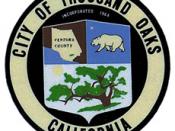In this synopsis I intend to analyse the rational choice model and its relevance in economic theory, using the utility theory as an example. Firstly I will define and explain rational choice and then introduce utility theory. From there I will move on to outlining some of the major criticisms of the rational choice model.
Rational choice is a psychological model directed at testing and analysing the rationality of individuals decisions. It was introduced to economics by John Mill, who adapted Bentham's pleasure-pain principle.
For an individual to behave rationally, he would have to 'attempt to obtain the greatest possible satisfaction from the money resources he has available when making a purchase' . Rational choice is therefore 'not a goal but a means to reach goals' . When deciding which action to take, an economic agent only has to consider the expected benefit from this action. H. A. Simon argued that 'the rational man of economics is a maximiser who will settle for nothing less but the best' .
The best way to show rational choice is by using an example. Assume agent A has a choice of two CDs, X and Y, but can only buy one of them, due to restricted monetary resources. As he prefers Y over X, he will therefore buy Y. This example shows that rational choice is about maximising satisfaction from actions taken.
Rationality as an attempt to maximise satisfaction has close ties with utility theory.
Utility is defined as 'the satisfaction or pleasure that an individual derives from the consumption of a good or service' . It is often argued that individuals are utility maximisers, meaning that they are trying to maximise their utility from a fixed limited income. In a two good world, the point of utility maximisation can be described as:...


